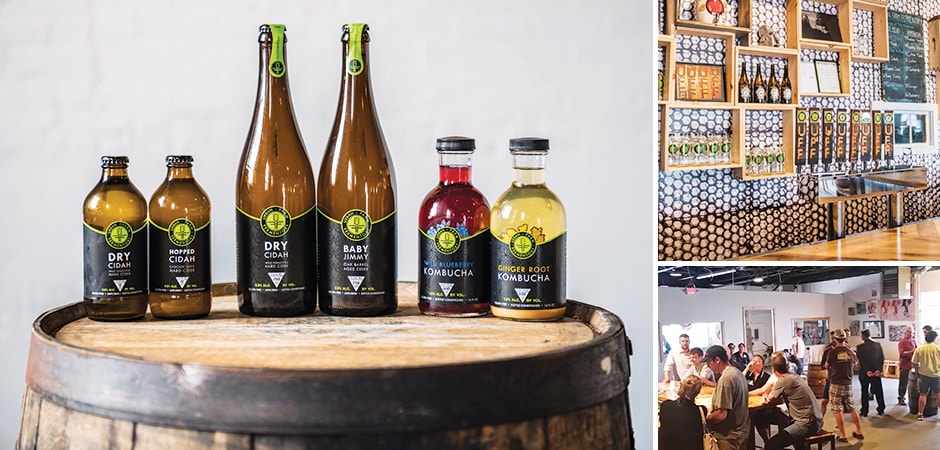Eli Cayer’s journey to successful Portland entrepreneur started with a unique problem—too much honey. With more honey than he could eat or give away, Cayer did what any resourceful Mainer would do—he researched his options and decided to start fermenting. The idea was simple—explore local ingredients, capture the essence of the pine tree state through fermentation, and offer it to the people there.
“The mission from day one has been to bring everything in as it’s available and process it in a variety of controlled ways to map it out. It’s designed to capture the essence of Maine.”
Eli first experimented with fermentation by making mead, then hard cider and finally, kombucha, a drink made from fermented tea. Cayer chose kombucha because he wanted to explore a beverage with ingredients that have “known medicinal value.” This was never just about making another hard cider—Eli is on a mission to enhance people’s lives, and becoming an ambassador for kombucha, “a high probiotic, lots of B vitamin, supplement,” seemed to be the best way to do that.
“It’s not just a beverage you drink for drinking. It’s a beverage you drink for realigning your body and making yourself better off.”
Funny enough, it’s not always the kombucha that first draws people to Urban Farm Fermentory, Cayer’s Portland, Maine retail location. Most come to check out UFF’s hard cider, and end up falling in love with the kombucha after sampling it in the tasting room. That makes education an integral part of his business. UFF offers single tastes, paddles (4 tastes), 12-ounce pours, and growlers of anything that’s currently on tap. There are twelve taps in the tasting room, offering a selection of mead, cider, and kombucha.
Kombucha, A to Z
From introducing people to kombucha, to detailing its reputed health benefits, to exploring the different ways it can be made (still or carbonated, sour or sweet), the staff at UFF will give you as much information as you want. And if you just want to sit back and try every flavor in the tasting room, that’s fine, too. You’re free to explore at your own pace, because Cayer knows that an informed consumer is a loyal consumer. “They’re coming to the workshops, they’re going on the foraging missions, they are your sales force in a lot of ways because they are a part of the experience and they share that.”
“You’ve got to do what you love. That’s the driving force. If you love it, it keeps you going.”
Eli’s own education is an ongoing process, too. Herbalists and foragers (and loyal UFF customers) come to him with tips on potential ingredients to try, and he takes regular foraging trips with his staff. Those trips serve a dual purpose—as fun bonding experiences, and to gather ingredients for the next batch of beverages for the tasting room.
“Sunday we’re going on a canoe trip as a fun thing to do, but we’re also going to be foraging the whole time, looking for ingredients. So it’s just fun. It’s a good life to live, you know.”
Maine Mission
From the looks of things, his mission is working and loyal fans are spreading the word. UFF recently completed a renovation of their warehouse space, adding a larger tasting room to accommodate the busloads of visitors they get each day. And every person who walks through the doors is another opportunity for Eli and UFF to spread the mission of embracing local Maine flavors and introducing people to more of the good life.
Five Tips on Fermentation & Flavors
Here are a few rules Eli lives by to keep his creations fresh and interesting.
- Experiment with different processing techniques: One ingredient can have different outcomes when processed in different ways. For example, staghorn sumac is bitter when made into a hot tea with boiling water, but when it’s used in a sun tea (no hot water; you just let water and sumac sit in the sun), there’s a huge difference in the taste.
- Map out flavors: After you’ve tried different processing techniques, you’ll know how to achieve different outcomes for each ingredient and can plan ahead for seasonal adjustments.
- Stay local: Explore local flavors and ingredients; they’ll be more plentiful, better quality, and (when in season) likely cheaper than sourcing and shipping ingredients from other places.
- Don’t be afraid to try unconventional flavors: Seaweed kombucha, made with dried and steeped kelp from the Maine coast, was one of Urban Farm Fermentory’s summer kombucha flavors. While it may not be for everyone, having unconventional flavors available for more adventurous customers will keep people coming back and keep you interested in mixing it up.
- Consider alternative ingredients: UFF is looking at using raspberry leaves as a substitute for the Chinese tea they’ve been using, and they are also exploring a kombucha-like culture called jun. Researching and experimenting with little-known ingredients will make your products stand out.
Connect with the Brewer
Eli Cayer owns Urban Farm Fermentory in Portland, Maine, named one of “The 10 Best Craft Breweries to Hit Up in New England This Summer” by Bloomberg.com, and was named a 2014 Coastal New England Rising Star by StarChefs. Connect with Eli on Facebook and Twitter.

